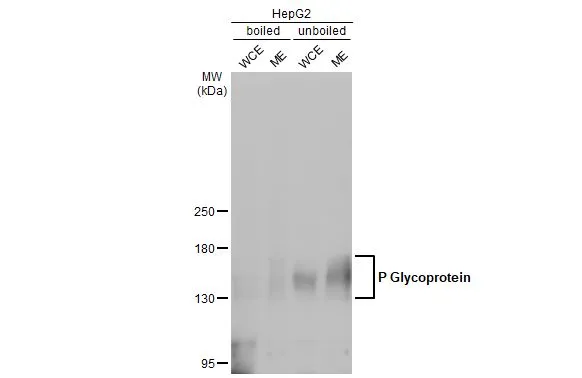anti-MDR1 / P Glycoprotein 1 antibody [UIC2] (low endotoxin)
ARG42283
ApplicationsFunctional Assay, Flow Cytometry, ImmunoPrecipitation, ImmunoHistoChemistry, ImmunoHistoChemistry Frozen, ImmunoHistoChemistry Paraffin
Product group Antibodies
ReactivityHuman
TargetABCB1
Overview
- SupplierArigo Biolaboratories
- Product Nameanti-MDR1 / P Glycoprotein 1 antibody [UIC2] (low endotoxin)
- Delivery Days Customer23
- ApplicationsFunctional Assay, Flow Cytometry, ImmunoPrecipitation, ImmunoHistoChemistry, ImmunoHistoChemistry Frozen, ImmunoHistoChemistry Paraffin
- CertificationResearch Use Only
- ClonalityMonoclonal
- Clone IDUIC2
- Concentration1 mg/ml
- ConjugateUnconjugated
- Gene ID5243
- Target nameABCB1
- Target descriptionATP binding cassette subfamily B member 1
- Target synonymsABC20, CD243, CLCS, ENPAT, GP170, MDR1, P-GP, PGY1, p-170, ATP-dependent translocase ABCB1, ATP-binding cassette, sub-family B (MDR/TAP), member 1, P-glycoprotein 1, colchicin sensitivity, doxorubicin resistance, multidrug resistance protein 1, phospholipid transporter ABCB1
- HostMouse
- IsotypeIgG2a
- Scientific DescriptionThe membrane-associated protein encoded by this gene is a member of the superfamily of ATP-binding cassette (ABC) transporters. ABC proteins transport various molecules across extra- and intra-cellular membranes. ABC genes are divided into seven distinct subfamilies (ABC1, MDR/TAP, MRP, ALD, OABP, GCN20, White). This protein is a member of the MDR/TAP subfamily. Members of the MDR/TAP subfamily are involved in multidrug resistance. The protein encoded by this gene is an ATP-dependent drug efflux pump for xenobiotic compounds with broad substrate specificity. It is responsible for decreased drug accumulation in multidrug-resistant cells and often mediates the development of resistance to anticancer drugs. This protein also functions as a transporter in the blood-brain barrier. Mutations in this gene are associated with colchicine resistance and Inflammatory bowel disease 13. Alternative splicing and the use of alternative promoters results in multiple transcript variants. [provided by RefSeq, Feb 2017]
- ReactivityHuman
- Storage Instruction-20°C
- UNSPSC12352203





